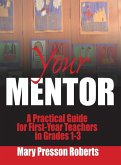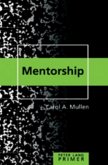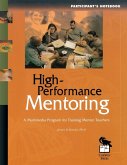- Gebundenes Buch
- Merkliste
- Auf die Merkliste
- Bewerten Bewerten
- Teilen
- Produkt teilen
- Produkterinnerung
- Produkterinnerung
Used to successfully train thousands of teachers, the author's mentoring framework provides a developmental approach to the mentoring process that ensures personal and professional growth.
Andere Kunden interessierten sich auch für
![Your Mentor Your Mentor]() Mary Presson RobertsYour Mentor69,99 €
Mary Presson RobertsYour Mentor69,99 €![A Family/Teacher/Mentor Guide A Family/Teacher/Mentor Guide]() Carolyn Ashe StokesA Family/Teacher/Mentor Guide49,99 €
Carolyn Ashe StokesA Family/Teacher/Mentor Guide49,99 €![Mentorship Primer Mentorship Primer]() Carol A. MullenMentorship Primer20,85 €
Carol A. MullenMentorship Primer20,85 €![How to be a Brilliant Mentor How to be a Brilliant Mentor]() How to be a Brilliant Mentor199,99 €
How to be a Brilliant Mentor199,99 €![Mentoring the Mentor Mentoring the Mentor]() Jennifer L. MartinMentoring the Mentor49,99 €
Jennifer L. MartinMentoring the Mentor49,99 €![High-Performance Mentoring Participant's Notebook High-Performance Mentoring Participant's Notebook]() James B. RowleyHigh-Performance Mentoring Participant's Notebook24,99 €
James B. RowleyHigh-Performance Mentoring Participant's Notebook24,99 €![High Performance Concrete Properties & Applications High Performance Concrete Properties & Applications]() Mayank DaveHigh Performance Concrete Properties & Applications11,99 €
Mayank DaveHigh Performance Concrete Properties & Applications11,99 €-
-
-
Used to successfully train thousands of teachers, the author's mentoring framework provides a developmental approach to the mentoring process that ensures personal and professional growth.
Produktdetails
- Produktdetails
- Verlag: Corwin
- Seitenzahl: 208
- Erscheinungstermin: 21. Juni 2006
- Englisch
- Abmessung: 235mm x 157mm x 16mm
- Gewicht: 459g
- ISBN-13: 9781412917667
- ISBN-10: 1412917662
- Artikelnr.: 22274170
- Herstellerkennzeichnung
- Libri GmbH
- Europaallee 1
- 36244 Bad Hersfeld
- gpsr@libri.de
- Verlag: Corwin
- Seitenzahl: 208
- Erscheinungstermin: 21. Juni 2006
- Englisch
- Abmessung: 235mm x 157mm x 16mm
- Gewicht: 459g
- ISBN-13: 9781412917667
- ISBN-10: 1412917662
- Artikelnr.: 22274170
- Herstellerkennzeichnung
- Libri GmbH
- Europaallee 1
- 36244 Bad Hersfeld
- gpsr@libri.de
James B. Rowley is the James Leary Professor in the School of Education and Allied Professions at the University of Dayton and the executive director of the Institute for Technology-Enhanced Learning. Over the past 20 years, he has focused his scholarship on the training and support of mentors and beginning teachers and has served as an entry-year program consultant and mentor teacher trainer for over 100 school districts. He is also the co-creator of other multimedia training programs, including Recruiting and Training Successful Substitute Teachers (1998), Becoming a Star Urban Teacher (1995), and Mentoring the New Teacher (1994). In addition to the multimedia publications listed above, Rowley is the author of numerous articles, book chapters, and monographs. He is the author of the Corwin Press book Becoming a High-Performance Mentor: A Guide to Reflection and Action (2006). Rowley has delivered over 200 presentations at professional conferences and has led training programs throughout the United States. In 1993 and 995, he was the recipient of the National Association of Teacher Educator's annual award for Distinguished Research in Teacher Education. In 1985, he was selected as a national semi-finalist in the NASA's Teacher in Space program and competed for the chance to be the first private citizen in space. He earned his doctorate in educational policy and leadership from The Ohio State University.
List of Tables and Figures
Preface
Acknowledgments
About the Author
1. Introduction
Many Right Ways
Depends on What?
A Framework for Reflection and Self-Assessment
2. Mentoring
Low- to High-Performance Mentoring
Quality Mentoring as Quality Conversation
Good Mentoring as Good Teaching
Mentoring as Pathway to Personal Growth
The Development of the Mentoring Relationship
Questions for Reflection on Mentoring
3. Committing
Commitment and Influence
Causes of Low Mentor Commitment
Low Mentee Commitment
Commitment Indicators
Questions for Reflection on Committing
4. Accepting
The Challenge of Acceptance
Relationship of Acceptance and Understanding
Acceptance Indicators
Questions for Reflection on Accepting
5. Communicating
A Conversation Revisited
Developmental Mentoring
Beliefs Influence Practice
The Mentor Teacher Beliefs Inventory
From Theory to Practice
To Guide or Not to Guide
Communication Indicators
Questions for Reflection on Communicating
6. Coaching
Relationship of Mentoring to Coaching
Cognitive Coaching
Coaching for Confidence and Competence
Coaching as Cognitive Apprenticeship
The Role of Observation in Coaching
Coaching Indicators
Questions for Reflection on Coaching
7. Learning
Embracing New Ideas
Open to New Behaviors
Formal and Informal Teacher Learning
A Framework for Teacher Learning
Learning Indicators
Questions for Reflection on Learning
8. Inspiring
Personal Reflections on Inspiration
Inspiration Indicators
Questions for Reflection on Inspiring
References
Index
Preface
Acknowledgments
About the Author
1. Introduction
Many Right Ways
Depends on What?
A Framework for Reflection and Self-Assessment
2. Mentoring
Low- to High-Performance Mentoring
Quality Mentoring as Quality Conversation
Good Mentoring as Good Teaching
Mentoring as Pathway to Personal Growth
The Development of the Mentoring Relationship
Questions for Reflection on Mentoring
3. Committing
Commitment and Influence
Causes of Low Mentor Commitment
Low Mentee Commitment
Commitment Indicators
Questions for Reflection on Committing
4. Accepting
The Challenge of Acceptance
Relationship of Acceptance and Understanding
Acceptance Indicators
Questions for Reflection on Accepting
5. Communicating
A Conversation Revisited
Developmental Mentoring
Beliefs Influence Practice
The Mentor Teacher Beliefs Inventory
From Theory to Practice
To Guide or Not to Guide
Communication Indicators
Questions for Reflection on Communicating
6. Coaching
Relationship of Mentoring to Coaching
Cognitive Coaching
Coaching for Confidence and Competence
Coaching as Cognitive Apprenticeship
The Role of Observation in Coaching
Coaching Indicators
Questions for Reflection on Coaching
7. Learning
Embracing New Ideas
Open to New Behaviors
Formal and Informal Teacher Learning
A Framework for Teacher Learning
Learning Indicators
Questions for Reflection on Learning
8. Inspiring
Personal Reflections on Inspiration
Inspiration Indicators
Questions for Reflection on Inspiring
References
Index
List of Tables and Figures
Preface
Acknowledgments
About the Author
1. Introduction
Many Right Ways
Depends on What?
A Framework for Reflection and Self-Assessment
2. Mentoring
Low- to High-Performance Mentoring
Quality Mentoring as Quality Conversation
Good Mentoring as Good Teaching
Mentoring as Pathway to Personal Growth
The Development of the Mentoring Relationship
Questions for Reflection on Mentoring
3. Committing
Commitment and Influence
Causes of Low Mentor Commitment
Low Mentee Commitment
Commitment Indicators
Questions for Reflection on Committing
4. Accepting
The Challenge of Acceptance
Relationship of Acceptance and Understanding
Acceptance Indicators
Questions for Reflection on Accepting
5. Communicating
A Conversation Revisited
Developmental Mentoring
Beliefs Influence Practice
The Mentor Teacher Beliefs Inventory
From Theory to Practice
To Guide or Not to Guide
Communication Indicators
Questions for Reflection on Communicating
6. Coaching
Relationship of Mentoring to Coaching
Cognitive Coaching
Coaching for Confidence and Competence
Coaching as Cognitive Apprenticeship
The Role of Observation in Coaching
Coaching Indicators
Questions for Reflection on Coaching
7. Learning
Embracing New Ideas
Open to New Behaviors
Formal and Informal Teacher Learning
A Framework for Teacher Learning
Learning Indicators
Questions for Reflection on Learning
8. Inspiring
Personal Reflections on Inspiration
Inspiration Indicators
Questions for Reflection on Inspiring
References
Index
Preface
Acknowledgments
About the Author
1. Introduction
Many Right Ways
Depends on What?
A Framework for Reflection and Self-Assessment
2. Mentoring
Low- to High-Performance Mentoring
Quality Mentoring as Quality Conversation
Good Mentoring as Good Teaching
Mentoring as Pathway to Personal Growth
The Development of the Mentoring Relationship
Questions for Reflection on Mentoring
3. Committing
Commitment and Influence
Causes of Low Mentor Commitment
Low Mentee Commitment
Commitment Indicators
Questions for Reflection on Committing
4. Accepting
The Challenge of Acceptance
Relationship of Acceptance and Understanding
Acceptance Indicators
Questions for Reflection on Accepting
5. Communicating
A Conversation Revisited
Developmental Mentoring
Beliefs Influence Practice
The Mentor Teacher Beliefs Inventory
From Theory to Practice
To Guide or Not to Guide
Communication Indicators
Questions for Reflection on Communicating
6. Coaching
Relationship of Mentoring to Coaching
Cognitive Coaching
Coaching for Confidence and Competence
Coaching as Cognitive Apprenticeship
The Role of Observation in Coaching
Coaching Indicators
Questions for Reflection on Coaching
7. Learning
Embracing New Ideas
Open to New Behaviors
Formal and Informal Teacher Learning
A Framework for Teacher Learning
Learning Indicators
Questions for Reflection on Learning
8. Inspiring
Personal Reflections on Inspiration
Inspiration Indicators
Questions for Reflection on Inspiring
References
Index









